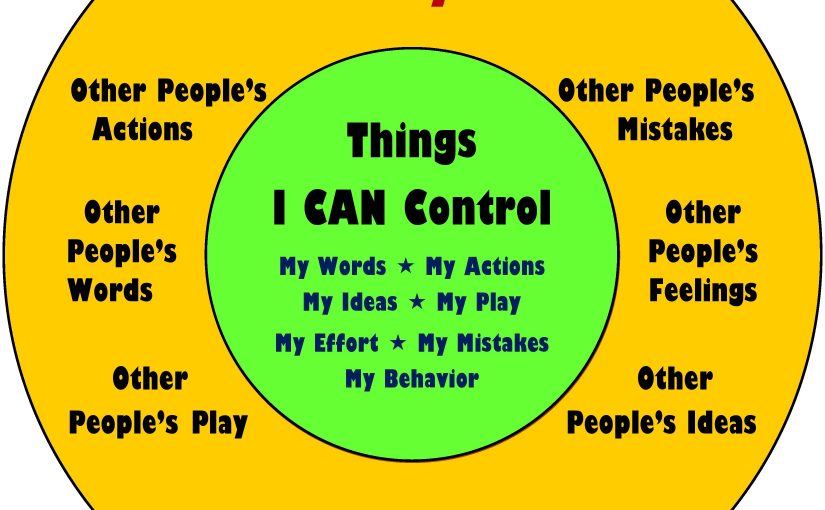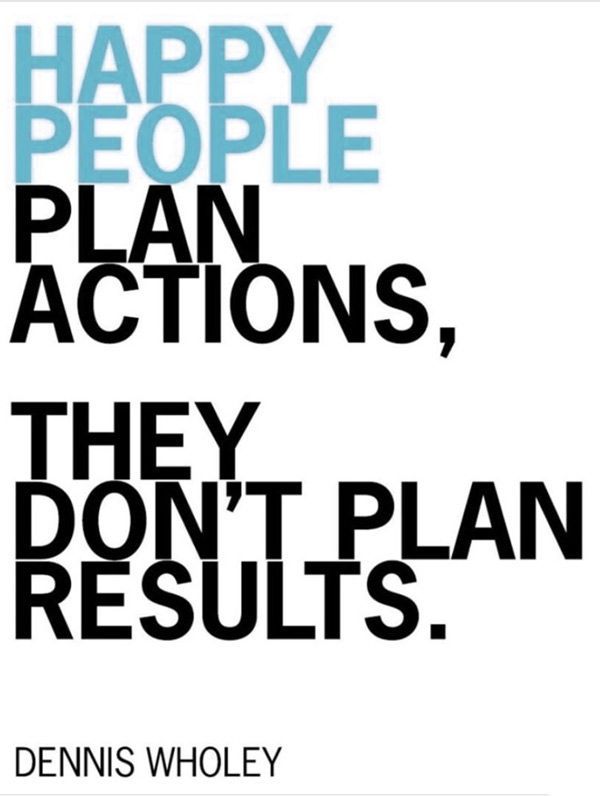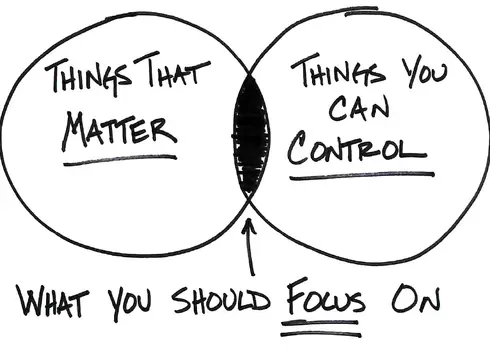Sales and sports are examples of two highly competitive fields. These are fields where no matter what you do, the rewards are based only on the results. Usually the winner takes all and the losers are left to rue. The winners are celebrated so much that they become glorified heroes. The losers are often fired from their jobs, benched for the next game or never get to play at the national level ever again.
In both fields, the results are not under anyone’s direct control. One salesman may remind a client of his son. So the client prefers that salesman even though another one had a better pitch. A figure skater’s score is at the mercy of 10 judges. Scores often differ by a tenth of a point between the winner and the runner-up.
Yet, so much is the disparity in rewards / punishments between closing a deal and not closing it, coming first and coming second, scoring a goal and not scoring, that the performers in these fields are stressed all the time. Eventually, they get obsessed with the results, become sore losers, no longer enjoying what they do. They become miserable with the fear of getting bad results and facing severe consequences engulfing them. All because their environment focuses too much on their output and not on their progress / effort / process.
Are results really worth it?
Of course they are. The anticipation of good results is what motivates us to take effort in the first place. Without a result as an end goal, we will just be instinctive rather than purposeful.
But in this post, I would like to distinguish between two types of results: those that you can control and those that you cannot. Priya has called them circles of life in a previous post. While I am not anti-results, I am totally against setting up goals with results which are not directly under our control. If your goal is a result that’s out of your control, then more than 50% of your brain power is also spent thinking about uncertainties, probabilities and permutations. What if you can focus with full certainty on what you can control instead? Most of the times, the results take care of themselves.
Examples of goals with results out of your control
- Finance: I will earn ₹ 20 lakh (aka 2 million Rupees) in business income this year.
- Cricket: I will hit the next ball for a six.
- Publishing: I will write a best-selling book on software engineering.
- Relationship: I will get married this year.
The problem with these goals
Whoa! If those are your goals, then you are getting way ahead of yourself. Let’s talk about things that aren’t in your control in each case.
- Finance: What services or products would you sell to total 20 lakhs in income? How many transactions in the year and how much to charge per transaction? Take my case. As a freelancer, it means the I must estimate the number of projects I’d have to do all year and the amount I need to charge for each. I need to find clients throughout the year that need my skill and make them agree to pay what I want. Not something that is within my direct control.
- Cricket: What kind of delivery will be the next ball? To which side of the field will you hit? How can you say with confidence that your shot will land outside the field and not into a fielder’s hands.
- Publishing: How can you be sure that the topic you cover is good enough for millions of people around the world? You can never know until the book is published, promoted and selling.
- Relationship: You need to find a person you are certain to spend your life with. He / she has to like you enough to spend his/her life with you. Families must be compatible. And so on and so forth.
Choose these goals instead
Finance
Instead of setting an income figure, your goal should be to set up opportunities.
- I will reply to all LinkedIn leads every Saturday and follow up with each lead within 3 days of my reply. Hopefully, some of them talk and we can close a deal.
- I have been seeing a lot of demand for dry fruits this festive season. I will contact the wholesale dealer of dry fruits and have them ship a 5 kg package to me. I will set up an Amazon business account and list the dry fruits as 25 200-gram packets. Even if 15 out of the 25 packets get sold, I will order more and expand the business.
Cricket
Instead of aiming to score a six, you should determine the shot and its direction.
Next ball, I will advance two steps down the pitch and hit the ball in the air towards the long-off boundary. Hopefully, my shot will clear the boundary.
Publishing
Instead of considering your book a best-seller, you should consider what content it has and when you will be ready to publish.
I will write a book on software design principles. Here are the chapters: …..
I will write one chapter every morning. At the end of the month, I will upload the book for publishing on Amazon Kindle.
Relationship
Instead of determining your future marital status, your goal should be to plan to meet people and make them feel loved.
- Arranged marriage: I will register on the online matrimony website and pick a profile that interests me. Thereafter, I will send a chat message to him/her in the chat section of the website. Hopefully we can take it from there. If one prospect fails, I will take a break of 3 days and find the next one.
- Love marriage: I really love my girlfriend and am ready to spend my life with her. I will buy a ring, plan a dinner and propose to her.
Why I recommend these type of goals?
In the modified goals, you have taken your focus away from results and set some goals with actions / processes. The actions are fully in your control. You concede that there are forces out of your control that will also have a say in the result. You have used the term ‘hopefully’ in all your action goals, wishing that the results are in your favour.
The idea is to dedicate yourself only to whatever you can give your 100% to. You won’t be wasting time thinking about factors you can’t control.
In business, you can choose to talk to leads and pitch to them in the best way you can. In cricket, you can choose your shot and its direction. In publishing, the topic is fully in your control and so is the act of writing and uploading. In a relationship, you choose to present yourself to a potential partner in the most loving way you can.
What if the outcome isn’t great?
Despite your best efforts, your business may tank, your shot may be caught by a fielder, your book may be obscure and your suitor may reject you. And that’s okay. Your response should not be to brood too much over the adverse results. Instead, you should learn your lessons, adjust your process and carry on with the next opportunity.
It’s okay even if there was no more you could have done and the failure happened due to factors out of your control. At least you did your best and left no stone unturned. Your next opportunity may have favourable conditions, even where you have no say.
How can you help someone be action-based?
If you are an executive, coach or a parent, it is your duty to set up incentives based on actions taken and efforts applied, and not purely on results.
You can pat the back of your product manager, who just released a product that failed in the market, despite the fact that he / she worked several months on it. You should tell him / her how much you loved the initiative and ask for suggestions on how he / she will do better next time. While this may not be possible in a large workforce, you can at least start with your direct reports and encourage them to do the same with the people working under them.
You can tell your son / daughter who failed to qualify for the district level of the dance competition that you loved his / her dedication and that you will support him / her during the next opportunity. You may even suggest that he /she look for a dance coach who can work out any shortcomings.
It is also your responsibility to point out excessive celebration during the good times and to guard against the tendency to display hubris, a fake veil of invincibility or hogging all the credit. A high flying sales executive has to be called out and told that the superior sales are also due to the product’s good performance, however important the marketing campaign may be. A superstar striker who scored the last minute goal that was the difference between the two teams, and hogs all the limelight as the game changer, has to be reminded that the defence and the goalkeeper did their job as well — by conceding one goal less than the opponent.
Above all, your incentive system should reward or at least encourage all those who set up goals with actions directly in their control and carried them out diligently.
Conclusion
In an environment, where performance is taken for granted and the effects of results set the stakes, it is important for you to find a way to stay focused on actions / processes and the progress they lead to. This is true whether you are the performer or are leading, coaching or mentoring a team of performers. This is only possible if your goals are based on actions under your direct control and the measurement of performance is based on the discipline exerted to complete those actions.



That’s an excellent post on how we should set up goals. Visualization of goals also largely fail when we focus on end result for example a thinner you as against the process, a healthy diet and sufficient exercises. End result in mind is no goal, its a wish… and if wishes were horses… 😀
Thanks. Yes it’s true that most goals are wishes, because the outcome is far beyond control. All you can do is put in your work and measure your progress. Even with excellent progress, you may not wrap up your goal, but you will have learnt a lot in the process to carry forward to the next goal.